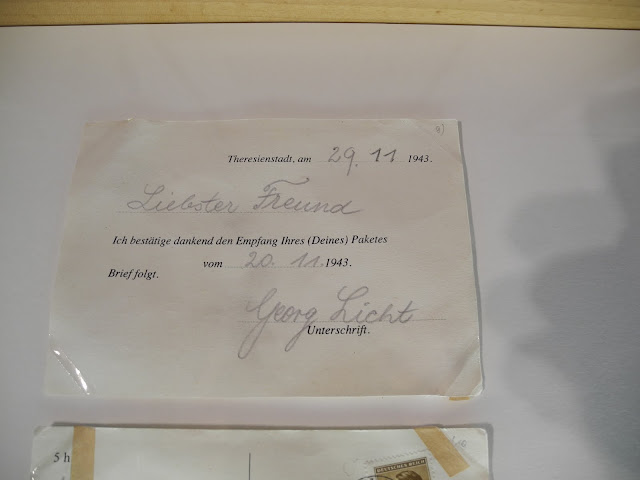On our last day together, we had a diverse program. In the morning we visited the upper house of parliament, the Bundesrat. After a lunch break, we met with our guide at the Blindenwerkstatt Otto Weidt. Otto Weidt was a small business owner who during the Third Reich employed Jewish workers in his brush factory in Berlin, thus saving them--at least for a short while--from deportation to concentration camps. Additionally, Otto Weidt worked with others to hide and protect Jews who were in danger of deportation, and so saved the lives of many people.
 |
| Bundesrat / Upper House of Parliament |
 |
| Entry hall of Bundesrat |
 |
| Gift from SFA students to Bernahrd as a thank you for all his work with our group |
 |
| What is it? |
 |
Die Eismanufaktur, die zweitbeste Eisdiele Berlins
The second-best ice cream shop in Berlin |
 |
Rosenthalerstrasse 39 - Blindenwerkstatt Otto Weidt steht links
Otto Weidt's workshop for the blind is on the left-hand side |
 |
| Layout of the workshop/museum |
 |
| Our museum guide in front of group picture of workers at the workshop for the blind |
 |
The workshop for the blind produced brushes that were considered critical for the war effort.
In this way, Otto Weidt was able to employ Jewish workers, thus saving them from deportation. |
 |
| One of the brush-making machines at the workshop |
 |
Letter from Alice Licht, a worker from the workshop who had been deported to Theresienstadt.
Otto Weidt hid supplies for her in a building near the camp. Alice Licht managed to escape the camp and reach the supplies. |
 |
| Letter from Alice Licht in Theresienstadt to Otto Weidt in Berlin. She signed the letter with her last name and a made-up second name, "Sorge" meaning "Worry." In this way prisoners were sometimes able to sneak messages from the camps. |
 |
This letter from Theresienstadt is to Otto Weidt, Potato Merchant.
Here Georg Licht was able to communicate the lack of food in the camps. |
 |
Personal identity card for the Jewish woman, Inge Deutschkron
Inge Deutschkron worked under a pseudonym, Inge Richter, at the workshop. She was one of the people Otto Weidt saved from deportation and death in the concentration camps. |
 |
| Inge Deutschkron's worker identity card, with her assumed name, "Richter" |
 |
Each worker had to keep a book, showing where s/he was employed. This is Inge Deutschkron's book.
Note that the Soviet authorities in East Berlin used this same book to register her employment in September, 1945. |
 |
Monument to the women who were murdered in the Ravensbrück concentration camp.
In front of the Old Jewish Cemetery |
 |
Jewish Boys' School, down the street from the Old Cemetery
The name remains on the building. Today it is a college-preparatory school for students in Berlin |
























No comments:
Post a Comment